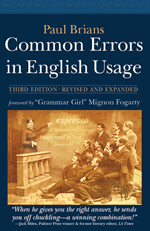begs belief
yanira.vargasYou beggar people by impoverishing them, reducing them to beggary. This term now survives mainly in metaphorical expressions such as “it beggars description” (exhausts my ability to describe it) or “it beggars belief” (exhausts my ability to believe it).
People who aren’t familiar with this meaning of the word “beggar” often substitute “beg,” saying of something implausible that it “begs belief.” This makes no sense, for it implies that the story is trying to persuade you to believe it.
BUY THE BOOK!
